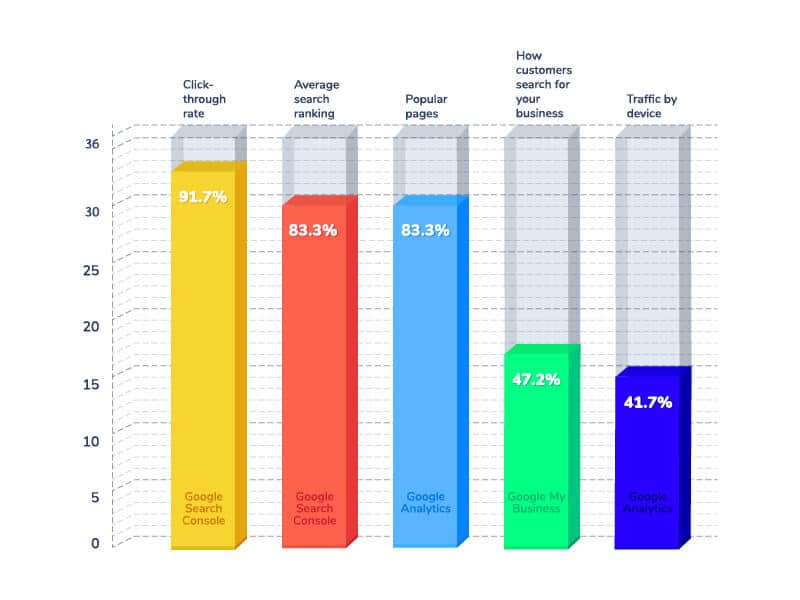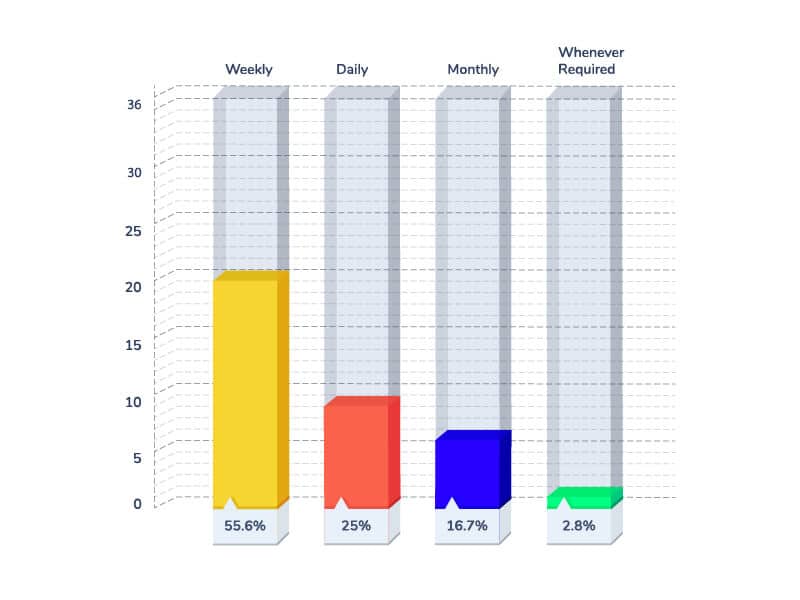Small business owners face an onslaught of daily tasks, so much so that it’s a challenge to tick everything off the list.
Analytics monitoring is one of these ‘to-dos’ that often gets put to one side because it’s too confusing and time-consuming.
However, without monitoring analytics you face continuous uncertainty regarding the effectiveness of your campaigns as well as wasting money and worse.
Keen to understand what industry experts thought, we interviewed 36 people from agencies, consultancies and marketing firms and asked them what their opinions and recommendations were when it comes to monitoring analytics.
Table of Contents
Most Important Metrics To Monitor
We gave them a range of metrics that we can all pull from Google Analytics, Google My Business, Google Search Console, and Facebook Insights to find out which they thought were the most important five metrics to monitor.
They answered…
- Click-through rate (Google Search Console) 33/36 or 91.7%
- Average search ranking (Google Search Console) 30/36 (83.3%)
- Popular pages (Google Analytics) 30/36 (83.3%)
- How customers search for your business (Google My Business) 17/36 (47.2%)
- Traffic by device (Google Analytics) 15/36 (41.7%)

You’d expect that with such a wide-ranging list of experts that the preferred analytics would differ. Not so.
When we asked the experts to select five ‘must-use’ metrics the answers showed Google Search Console’s (formerly Google Webmaster Tools) click-through rate metric as the favourite with 91.7% of the votes.
In case you didn’t know, Google Search Console is a tool that you have access to free as well as providing you among other metrics average search rankings (this was the respondents’ second-place recommendation). Search Console also shows a site’s indexing status and ways to optimise its visibility.
If you don’t have it set up already, now’s the time to create a Google Search Console account and link it to your site.
The set-up is reasonably straight-forward and if you’re comfortable with inserting a link into your web files you can set it up without the need of expert help.
Of course, learning how to use these different analytics might be off-putting, but says Omar Fonseca Digital Marketing Manager of Medicare Plan Finder, the benefits far outweigh any initial effort. ‘You must understand how each marketing channel has performed and the key takeaways. You need to master terms such as CPC, ROI, CTR and tons of other performance metrics. For you to sell a pitch or idea, you must back it up with reliable results, proof, and data,’ says Fonseca.
Erica Stacey of Scout Digital Training agrees, saying: ‘We are incredibly fortunate to have access to the level of data and analytics that we do, in such a rapid and responsive timeframe, however it can be overwhelming. This is why it is essential to know which metrics are most relevant and valuable to your business, and focus on them. Monitoring our online analytics (and balancing it with direct and anecdotal feedback) allows us to understand what is going on with our business online, our customers and potential customers, and their interest in our products and services. This allows us to make informed, strategic business and marketing decisions.’
And, while it’s tempting to carry on as you were, riding the uncertainty of why some of your strategies triumphs while others bomb, it just doesn’t make sense. As Alita Harvey-Rodriguez, Managing Director of MI Academy says: ‘Relying on a whim, textbook strategies, or even gut instinct, will see your business flush budget down the toilet. Analytics are the greatest asset for any growing business, as they help you identify the golden nuggets of opportunity, and develop a roadmap driven by insight and backed by data.’
How Often Should You Monitor?
We asked….
How often would you recommend small businesses check their analytics/insights?
They answered…
- Weekly 20/36 (55.6%)
- Daily 9/36 (25%)
- Monthly 6/36 (16.7%)
- Whenever Required 1/36 (2.8%)

Small businesses are often pushed for time, so the thought of having to check analytics daily might be off-putting. But what if not doing so means you fail to notice technical issues such as spam or online hacking?
Daily monitoring was something a quarter of all respondents recommended, including Gregory Golinski of Your Parking Space who said: ‘Monitoring your marketing metrics every day is very important, because it can help you fine-tune your marketing strategy. You can see where you need to focus your marketing efforts to improve your traffic and income: SEO? Paid ads? Social media? Monitoring your metrics every day can also help you spot technical issues with your website. Has it been the victim of an attack online? Spam? Has your website been down for a few hours, which might explain a loss in traffic?’
While it might be laborious at first, regular monitoring will ensure you become adept at finding the right metrics and understanding what they are telling you, something that Linda Reed-Enever of the Enever Group acknowledges: ‘Metrics let you know what is working so you can review and take action. They may seem overwhelming so start with one and understand that and then learn another metric. Baby steps is better than ignoring them all together.’
Conscious that small business owners suffer from severe time deficit, the majority (55.6%) of experts agreed that weekly monitoring was adequate. Sarah Evans of Sevans Strategy was one such respondent, saying: ‘You can’t change or improve what you don’t know. Keeping your pulse on all aspects of your business gives you potential to do better on behalf of your customers. It’s a backchannel for customer input. Monitor to move ahead.’
Matt Bassos, Head of SEO, Vuly Play, said: ‘While in a perfect world checking it [metrics] daily would be ideal, small businesses should at least try to monitor their marketing metrics at least once a week.’
But why is even once a week necessary? Because with small businesses usually come smaller budgets. Optimising your budget is something that Emily Forest, Head of Business at Reload Media was at pain to emphasise: ‘As you’re starting out, every dollar spent on marketing should be monitored so you know if your ads aren’t running or you are overspending (which can all happen quite quickly). That being said, unless you know for SURE something isn’t working, we wouldn’t recommend making any large-scale changes based on daily statistics, these types of decisions should be made with a larger data set of 2-4 weeks pending the data size. The key thing is to make sure it holds statistical significance before making any changes.’
Derrick Rehn, SEO Specialist at Integritive also highlights the importance of checking your metrics every week, in particular to assess your keyword rankings and traffic. ‘Marketing metrics should be the determinant of the effectiveness of your marketing campaigns. If you do weekly marketing outreach, you should check the engagement this has garnered. Knowing how you rank for your keywords, and how enticing your page is, is a strong indicator of how you can increase your traffic. By understanding which channels provide the most value, users can make informed decisions related to how they spend their budget and where.’
Alexander Porter, Search It Local’s SEO Specialist was among the 16.7% who thought that monthly monitoring would suffice. He said, ‘Small business owners are experts in their industries — not necessarily experts in data and analytics. By checking data monthly – that’s across Search Console, Analytics and GMB Insights – they can make informed decisions. If you can measure it, you can change it. If you can change it, you can improve it.’
And last, Andy Crestodina, Co-founder and CMO of Orbit Media advised that small businesses check their analytics whenever necessary, his reason being: ‘Without data, you can’t answer questions about marketing performance. You can’t test hypotheses. You can’t iterate and improve …you’re screwed.’
Why Is It So Important?
Finally, we asked…
Why is it important for small business to regularly monitor their marketing metrics?
Our respondents’ answers were varied, with three main reasons why regular metrics monitoring was crucial.
Optimise Small Budgets
For instance, many, including Jeroen Minks, Digital Marketing Specialist at Vazooky Digital pointed out the need to make full use of a small business’ limited budgets. ‘Understanding your marketing ROI on a channel or even campaign level is essential in making decisions of where you should spend your marketing budget. This will help to get more results out of your budget,’ said Minks.
This sentiment was also shared by Amanda DiSilvestro, Discover Corps’ Marketing Manager who said: ‘If you aren’t monitoring metrics, then you are making decisions based on opinions and not on facts. Data is an incredible way to get into the minds of your consumers and see what works and what doesn’t work, which will help you ultimately grow in the end.’
Gemma Renton also felt the same, the owner and lead PPC specialist for Vine Street Digital said: ‘Monitoring marketing metrics is not just about being reactive, it’s also about grounding business decisions in data. Digital marketing gives you incredible data about consumer behaviours and reactions to your business and brand, so frequently monitoring this can give you that proactive edge you’re looking for in order to grow. ‘
Identify Issues Early
However, what happens when small businesses don’t use metrics at all?
Is it just a matter of carrying on cluelessly and carefree? No.
There are some dangerous consequences to consider, as highlighted by Rob Stand of SEO Better, who said, ‘You can monitor if something has gone wrong after a website update. Sometimes there will be problems with redirect issues, duplicate content and if you are working on content translation there may be HTML crawlability issues. It is also advisable to watch your ranking data based on the fact that rankings can drop over time if you have implemented changes on your website.’
Adam Connell of Blogging Wizard agreed with how metrics can help business owners spot serious errors, stating ‘While metrics tell us what’s working (and what’s not), they can also tell us when something needs fixing or there’s an issue that requires immediate action. For example, if someone accidentally adds a noindex tag while updating a site, or traffic plummets for a revenue-generating page – you need to know immediately – not in a month’s time.’
Mark Pratt, Marketing Manager of Click Send was also keen to point out how metrics can highlight issues, ‘ It’s very important to ensure that any changes made to your site do not have a negative impact, or if there’s a positive impact to be able to replicate it. However, traffic and follower volumes do fluctuate daily, so avoid making knee-jerk reactions when seeing slight dips in these numbers and get more data before making any big changes.’
What Is Working, What Is Not
Finally, most of our experts agreed that metrics simply help you to understand which of your marketing strategies are working and, of course, which are not. Jaykishan Panchal of E2M said, ‘Regular monitoring will give you a detailed picture of how your marketing efforts are faring in a competitive environment. The frequent analysis will help you justify the marketing spend and investments in successful channels. You will be able to gauge what clicks and what doesn’t and derive insights to patch broken marketing processes intelligently.’
Newaz Chowdhury, Digital Marketing Manager of Power Phrase also pointed out: ‘It’s important to understand your KPI’s so you know what’s going on. Where are you site visitors coming from? How long are they staying? Are they doing what you want them to do? Contacting you? Analytics provides details to see how your sites doing. If something is not right, then you know there needs to be changes on your website. Like the UI or UX.’
While understanding and monitoring analytics metrics sounds like a chore, it is in fact a way to cut down on much of your work. If you can get on top of your analytics you won’t have to spend hours coming up with new strategies – you tweak what’s already there.
And, while some put it off, it’s also never too early to start monitoring your analytics, as Milan Narayan, Head of Digital at Adoni Media advises: ‘During the infancy of a new business there can be many moving parts. Knowing the relationship one variable has with another is crucial to understand how to cater to your market. Not doing so could be costly now and in the future. Simply, without measuring, you cannot expect to improve.’





